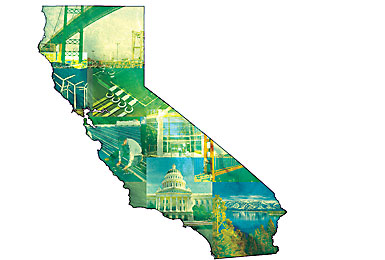Location California 2009: California's Road to Recovery
Numerous challenges facing the state are being addressed in order to keep - and attract - companies and high-paying jobs in California.
Oct/Nov 09

For example, according to the U.S. Bureau of Economic Analysis, in 2008 California's economy grew 2.5 percent despite being at the center of the housing bust. Also, the state ranked first in patents and start-ups, and in new branches in the bioscience, high-tech manufacturing, logistics, and other sectors. More recently, according to the Federal Reserve Bank of Philadelphia, California continues to outperform its neighboring states.
Nonetheless, unemployment is at an unacceptably high level, both because of the housing crash and because California has had a structural unemployment rate exceeding the national rate since the early 1990s; thus, job growth is an urgent need and the top priority of the Schwarzenegger administration.
Natural Advantages
In an article earlier this year, The Economist aptly characterized California as "restless, chaotic, and experimental," stating that "few places make as many mistakes as California; fewer still have the capacity to recover from them so quickly."
California's natural advantages, which include an idyllic climate, stunning geography, and a culture of openness and tolerance, still attract and retain many who desire to live and work in a place that offers significant quality-of-life benefits. The resulting ample availability of human capital, combined with the continuing availability of venture capital funding and with world-class public and private universities, produces an innovative climate that contributes to the state's resilience.
Furthermore, these advantages make California an incredibly dynamic place, one that epitomizes Austrian economist Joseph Schumpeter's concept of "creative destruction," with companies and industries changing rapidly and often. This explains why California has been the birthplace of the world's most innovative companies, ranging from Disney and Amgen to Apple, Intel, Google, and many, many more.
Clean Technology
More recently the state has become home to companies seeking to take advantage of Governor Schwarzenegger's commitment to addressing climate change and to making California the center of the new "clean-tech" sector. California leads the nation in every category of clean-tech investment, according to the Pew Institute. Venture capital into California clean-tech was $3.3 billion in 2008, five times greater than the second-place state, and from 2002 to 2007 California led all states in patent applications for green technologies, a 70 percent increase over the previous five-year period.
Just a few examples of recent California clean-tech developments include Exxon-Mobil's $600 million partnership with Craig Venter's La Jolla biotech company to develop fuels from algae; Bay Area company Echelon being awarded a $450 million energy-efficiency contract with an East Coast utility; and the federal government awarding more than $500 million to Irvine-based Fisker Automotive for electric cars.
Reforming the Tax System
While it is true that California continues to hold numerous advantages for businesses looking to expand or relocate, there are still a number of immediate challenges that will threaten California's future prosperity if not addressed.
This year, in particular, we have witnessed firsthand the inadequacy of California's dysfunctional tax system to provide reliable revenue for important government programs. The current tax structure produces unpredictable revenues and consistently leads to a destructive boom-or-bust cycle that is more closely and narrowly linked to Wall Street's gains and losses than to the state's broad, stable, and diverse economy. Unfortunately, this means that California's budget system consists of unpredictable and volatile revenues derived from largely undependable sources, and explains why California's economy can grow 2.5 percent in 2008 but see its tax revenues fall 20 percent.
Worse, when governments make unsustainable promises during the revenue boom years, they are left to foot the bill for these promises during revenue busts. As a result, when revenues decline, funding for health, welfare, parks, higher education, environmental protection, local governments, and more suffers as money is diverted to pay for promises that were made but not funded when the budget was flush. The all-important University of California is currently experiencing this harsh reality as state funding is reduced in order to pay for past promises to others.
In order to deal with this problematic cycle, Governor Schwarzenegger established the Commission for the 21st Century Economy last fall and charged the commission with the responsibility of developing a reform proposal for California's broken tax system. Focused on smoothing the current system's destructive volatility and making revenue more predictable, the commission has recently submitted its findings to the Governor, and these proposals will subsequently be examined by a special session of the legislature.
Project Announcements
Archer Plans Vernon, California, Production Operations
05/12/2025
OnSight Technology Establishes Folsom, California, Headquarters
07/25/2024
Takeda Pharmaceuticals Expands Los Angeles, California, Operations
06/17/2024
ThermoGenesis Holdings Establishes Rancho Cordova, California, Operations
10/28/2023
Reyes Coca-Cola Bottling Expands Rancho Cucamonga, California, Operations
09/08/2023
Trader Joe's Establishes Palmdale, California, Operations-Distribution Complex
07/14/2023
Bosch Establishes Roseville, California, Operations
04/28/2023
Solidigm Plans Rancho Cordova, California, Global Research-Development Complex
10/05/2022
Orca Bio Establishes Sacramento, California, Research Complex
09/15/2022
Toyota Motor North America Upgrades Long Beach, California, Manufacturing Plant
03/20/2022
Patriot Rail Plans Merced, California, Rail District Hub
02/10/2022
AutoZone Establishes Chowchilla, California, Distribution Hub
12/23/2021
South Korea-Based Pulmuone Expands Fullerton, California, Plant
12/15/2021
TurtleTree Opens Sacramento, California, R&D Campus
10/15/2021
Most Read
-
Tariffs, Talent, and U.S. Expansion
Q3 2025
-
What We’re Getting Wrong About Gen Z’s Future in the Skilled Trades
Q3 2025
-
Data Center Demand Stabilizes Amid Changing Market Forces
Q3 2025
-
A New Course for U.S. Shipbuilding
Q3 2025
-
Optimizing Your Rail-Served Transportation Network: Strategy Before Steel
Q2 2025
-
In Focus: AI Is Changing Incentives Math
Q2 2025
-
Rewriting the Rules of Warehouse ROI
Q3 2025